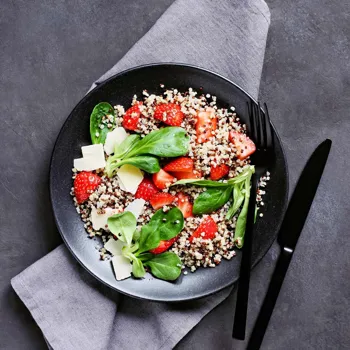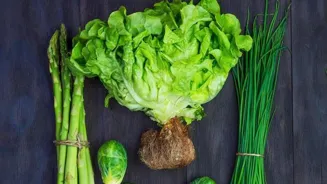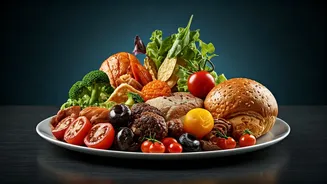Dive into the world of plant-based diets in India! Discover the benefits, concerns, and tips to get started. Read more!
Across India, a quiet food revolution is blooming. More and more folks are exploring
the world of plant-based diets. From bustling metros to smaller towns, the idea of focusing on fruits, vegetables, grains, and legumes is catching on.
But what exactly does "plant-based" mean, and is it the right choice for everyone? Let's dig in.
Plant-based diet's rising popularity due to health benefits, sustainability, and culinary diversity
First things first, let's clear up the confusion. A plant-based diet isn't necessarily the same as being vegetarian or vegan.

While vegetarians avoid meat, and vegans steer clear of all animal products (including dairy and eggs), a plant-based approach is more about prioritizing plants in your meals.
Think of it as shifting the focus to vegetables, fruits, whole grains, pulses, and nuts, making them the stars of your plate. Some people on plant-based diets might occasionally have small amounts of dairy, eggs, or even fish. So, it's more of a spectrum than a strict label.
What's driving this trend? There are several reasons why people are choosing to eat more plants. Health is a big motivator. Many studies suggest that plant-based diets can help with weight management, lower the risk of heart disease, and even prevent type 2 diabetes.
Then there's growing awareness about the environmental impact of our food choices. Plant-based meals generally have a smaller carbon footprint than diets heavy on animal products. And let's not forget the delicious variety!
From vibrant vegetable curries to hearty lentil soups, the world of plant-based cuisine is incredibly diverse and flavorful. For many Indians, eating more plant-based food feels like a natural extension of our existing culinary traditions.
After all, vegetarian dishes have always been a cornerstone of Indian cuisine, with countless regional variations and flavor combinations.
Plant-based diets promote health by reducing chronic diseases in India
The potential health benefits of embracing a plant-based lifestyle are attracting a lot of attention, and for good reason. Studies consistently link diets rich in plants to a reduced risk of several chronic diseases that are common in India.
Heart disease, a leading cause of mortality, can often be kept at bay with a diet low in saturated fat and cholesterol, both of which are typically higher in animal products.
Plant-based diets, on the other hand, are naturally rich in fiber, which helps lower cholesterol levels and improves overall heart health. Type 2 diabetes, another growing concern in India, can also be managed and even prevented with a plant-focused diet.
Plant-based foods are generally lower on the glycemic index, meaning they don't cause rapid spikes in blood sugar levels. Regular consumption of legumes, whole grains, and vegetables can help regulate blood sugar and improve insulin sensitivity.
Furthermore, plant-based diets are packed with vitamins, minerals, and antioxidants, which play a crucial role in maintaining a healthy immune system and protecting against various illnesses. The abundance of fruits and vegetables ensures that you're getting a wide range of essential nutrients.
And let's not forget about weight management. Plant-based foods are often lower in calories and higher in fiber, which can help you feel fuller for longer and promote healthy weight loss or maintenance.
Start small with plant-based meals for a sustainable change
Thinking about making a change? It doesn't have to be drastic. Small, gradual steps are often more sustainable in the long run. Start by adding more plant-based meals to your week. Try swapping out one or two meat-based dishes for vegetarian or vegan options.

Explore the vast world of Indian vegetarian cuisine. There are countless delicious recipes featuring lentils, beans, vegetables, and spices. Think of dishes like dal makhani (without the cream, perhaps!), vegetable biryani, chana masala, or aloo gobi.
You can find numerous recipes online or in cookbooks. Another simple tip is to make vegetables the star of your plate. Instead of treating them as a side dish, make them the main focus.
Roast a tray of colorful vegetables like broccoli, carrots, and bell peppers and use them in salads, wraps, or alongside some whole grains. Don't forget about pulses like lentils, chickpeas, and kidney beans.
These are excellent sources of protein and fiber, and they can be used in a variety of dishes. Soups, stews, curries – the possibilities are endless. Experiment with different spices and herbs to add flavor and variety to your meals.
And when you're shopping, try to buy seasonal fruits and vegetables. They're often more affordable and taste better.
Adopting a plant-based diet: addressing protein, iron, B12 concerns economically
Many people have questions and concerns about adopting a plant-based diet, especially when it comes to getting enough protein and essential nutrients. Protein is often a primary concern.
However, it's entirely possible to meet your protein needs on a plant-based diet by including a variety of protein-rich plant foods like lentils, beans, chickpeas, tofu, tempeh, nuts, and seeds.
It's also worth remembering that many foods, like vegetables and grains, contain small amounts of protein, which add up over the course of the day. Iron is another nutrient that some people worry about.
Although plant-based sources of iron (non-heme iron) aren't as easily absorbed as iron from animal products (heme iron), you can improve absorption by consuming iron-rich foods along with vitamin C. For example, eat spinach with a squeeze of lemon juice or drink orange juice with your lentil soup.
Vitamin B12 is another important nutrient to consider, as it's primarily found in animal products. Vegans and some vegetarians may need to supplement with vitamin B12 to ensure they're getting enough. Speak with your doctor or a registered dietitian to determine if supplementation is right for you.
Finally, some people worry about the cost of plant-based diets. While some specialty ingredients can be expensive, many plant-based staples like lentils, beans, and seasonal vegetables are very affordable. Plan your meals around these budget-friendly ingredients.
Indian plant-based diet: rich tradition, diverse options, nutrient balance crucial
In India, the concept of plant-based eating isn't entirely new. For centuries, vegetarian and vegan traditions have been part of the cultural and religious landscape. Many Indian dishes are naturally plant-based or can be easily adapted to be so.
The diverse range of regional cuisines also offers a wealth of plant-based options. From the vegetable-rich curries of South India to the lentil-based dishes of the North, there's something for everyone to enjoy.
However, it's important to consider the specific challenges and opportunities that arise when adapting a plant-based diet to the Indian context.
For example, it's crucial to ensure that you're getting a balanced intake of nutrients, especially protein and iron, by including a variety of plant-based sources in your diet.
It's also important to be mindful of portion sizes and to avoid relying too heavily on processed or refined plant-based foods. These products can be high in sugar, salt, and unhealthy fats.
Adopting a plant-based diet is a personal choice based on health and lifestyle factors
Ultimately, the decision of whether or not to adopt a plant-based diet is a personal one. There's no one-size-fits-all answer. What works for one person may not work for another. It's important to consider your individual health needs, dietary preferences, and lifestyle factors.
Before making any major changes to your diet, it's always best to consult with your doctor or a registered dietitian. They can help you assess your nutritional needs and develop a personalized plan that's right for you.
They can also advise you on potential nutrient deficiencies and recommend appropriate supplements if needed. Remember, a plant-based diet isn't all or nothing. You can start by making small changes and gradually increase your intake of plant-based foods over time.
The goal is to find a way of eating that's both healthy and sustainable for you. And don't be afraid to experiment! The world of plant-based cuisine is vast and exciting. Explore new recipes, try different ingredients, and find what you enjoy.
With a little planning and creativity, you can create delicious and nutritious plant-based meals that nourish your body and soul.
AI Generated Content. Glance/InMobi shall have no liability for the content











